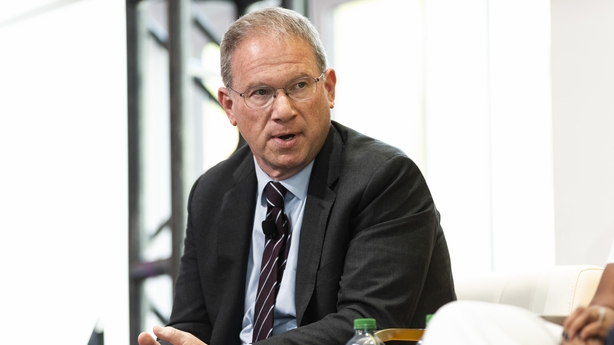The Trump administration has sought to contain the fallout after a magazine journalist disclosed he had been inadvertently included in a secret group discussion of highly sensitive war plans, while Democrats called on top officials to resign over the security incident.
Director of National Intelligence Tulsi Gabbard and CIA Director John Ratcliffe - both of whom were in the chat - testified before the Senate Intelligence Committee that no classified material was shared in the group chat on Signal, an encrypted commercial messaging app.
But Democratic senators voiced skepticism, noting that the journalist, Atlantic Editor-in-Chief Jeffrey Goldberg, reported that Defense Secretary Pete Hegseth posted operational details about pending strikes against Yemen's Iran-aligned Houthis, "including information about targets, weapons the US would be deploying, and attack sequencing."
Committee members said they planned - and Ms Gabbard and Mr Ratcliffe agreed to - an audit of the exchange. The Senate's Republican majority leader, John Thune, said he expected the Senate Armed Services Committee to look into Trump administration officials' use of Signal.

"It's hard for me to believe that targets and timing and weapons would not have been classified," Senator Angus King, a Maine independent who caucuses with Democrats, said at the contentious hearing, which featured several sharp exchanges.
The revelation yesterday drew outrage and disbelief among national security experts and prompted Democrats - and some of President Donald Trump's fellow Republicans - to call for an investigation of what they called a major security breach.
"I am of the view that there ought to be resignations, starting with the national security adviser and the secretary of defense," Democratic Senator Ron Wyden of Oregon said at the hearing.
But Mr Trump voiced support for his national security team when questioned about the incident at a White House event with Michael Waltz, his national security adviser who mistakenly added Goldberg to the Signal discussion.

Mr Trump said the administration would look into the use of Signal, but said he did not think Mr Waltz should apologise.
US Senator Jon Ossoff of Georgia appeared to grow frustrated after Mr Ratcliffe answered "I don't recall" to a series of questions about the content of the Signal chat.
"Director Ratcliffe, surely you prepared for this hearing today," Mr Ossoff said. "You are part of a group of principals, senior echelons of the US government, and now a widely publicised breach of sensitive information."
"We will get the full transcript of this chain, and your testimony will be measured carefully against its content," he added.
Some Republicans also wanted to know more. Senator Todd Young said he would inquire during a closed hearing later today. "It appears to me there are some unanswered questions," the Indiana Republican said.
A former US official told Reuters that operational details for military actions are typically classified and known to only a few people at the Pentagon and such top secret information is usually kept on computers that use a separate network.

National Security Council spokesperson Brian Hughes said yesterday that the chat group appeared to be authentic.
Sensitive information is not supposed to be shared on commercial mobile phone apps, and unknown numbers - such as Mr Goldberg's - should not have been included. Additionally, Signal's ability to erase conversations would violate laws governing the retention of government records.
"This is one more example of the kind of sloppy, careless, incompetent behaviour, particularly toward classified information... of this administration," the committee's Democratic vice chairman, Mark Warner of Virginia, said.
Accounts appearing to represent Vice President JD Vance, Secretary of State Marco Rubio, Ratcliffe, Gabbard, Treasury Secretary Scott Bessent, White House chief of staff Susie Wiles, and senior National Security Council officials were assembled in the chat group, Mr Goldberg wrote yesterday.
Ms Gabbard acknowledged that she had been abroad during the chat, although she declined to say whether she was using a private phone.
White House press secretary Karoline Leavitt accused Mr Goldberg of sensationalising the story in a post on X.
Also on X, White House communications director Steven Cheung dismissed as "faux outrage" the concern over the inclusion of a journalist in a war-planning chat.
Mr Hegseth told reporters yesterday that no one had texted war plans. Mr Goldberg, appearing on CNN yesterday, called those comments "a lie."
It remained unclear why the officials chose to chat via Signal rather than the secure government channels typically used for sensitive discussions.
We need your consent to load this rte-player contentWe use rte-player to manage extra content that can set cookies on your device and collect data about your activity. Please review their details and accept them to load the content.Manage Preferences
Signal has a "stellar reputation and is widely used and trusted in the security community," said Rocky Cole, whose cybersecurity firm iVerify helps protect smartphone users from hackers.
"The risk of discussing highly sensitive national security information on Signal isn't so much that Signal itself is insecure," Mr Cole added. "It's the fact that nation-states threat actors have a demonstrated ability to remotely compromise the entire mobile phone itself. If the phone itself isn't secure, all the Signal messages on that device can be read."
Republican Representative Don Bacon, a retired Air Force general who sits on the House Armed Services Committee, told reporters that Mr Hegseth needed to take responsibility for the breach, which he said put lives at risk.
Asked about the White House claim that no classified details were shared, Bacon responded: "They ought to just be honest and own up to it."

